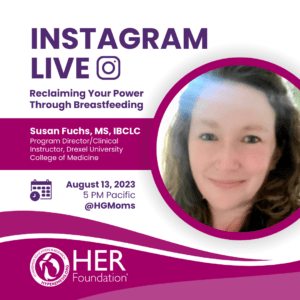

Join our Instagram Live with Susan Fuchs, MS, IBCLC, “Reclaiming Your Power Through Breastfeeding” on Sunday, August 13th, 2023, at 5pm Pacific. Hear Susan share her HG journey and expertise on breastfeeding in a conversation with Kimber MacGibbon, RN.
Learn more about:
- How breastmilk adapts to baby’s needs.
- How breastfeeding impacts our health.
- How breastfeeding affects mental health.
- How breastfeeding and weaning are affected by HG.
- 35% of HG patients do not breastfeed compared to 11% of controls.
Submit your questions here.
Breastfeeding is not an option for every mother. Those who have struggled with hyperemesis gravidarum (HG), who are facing malnutrition, trauma, and other complications may have greater difficulty successfully breastfeeding or may decide to nourish their baby with formula. Whether or not to breastfeed can be a complex, personal choice. In the end, the best choice is the one that ensures the well being of you and your child. Read our blog.
Hyperemesis Gravidarum (HG): a potentially life-threatening pregnancy disease that may cause malnutrition, dehydration, and debility due to severe nausea and vomiting, and may cause long-term health issues for mom and baby.
SHARE THE FACTS
- HG, hyperemesis gravidarum, is a pregnancy disease marked by rapid weight loss, malnutrition, and dehydration due to unrelenting nausea and/or vomiting.
- HG is not the “morning sickness” of healthy, normal pregnancies. It is a distinct diagnosis marked by severe and relentless symptoms that pose significant risks to the health of both mother and baby. Over 1/3rd of HG babies do not make it to term.
- HG babies are at increased risk for low birth weight, small size for gestational age, and preterm birth. In utero exposure to HG is linked to a 3.6-fold increased risk of emotional/behavioral & developmental disorders.
- Nearly 20% of HG pregnancies are lost to therapeutic terminations, citing “no hope for relief.” Current treatments are not adequate to prevent termination of these planned, wanted pregnancies.
- Mothers with HG’s most severe forms can experience pneumothorax, organ rupture, retinal detachment and blindness, eardrum and jaw damage, rib fractures, esophageal tears, the neurological syndrome Wernicke’s encephalopathy, or even death.
- 18% of women report full criteria of post-traumatic stress syndrome (PTSS) following an HG pregnancy. More than half of mothers have post-traumatic stress symptoms.
- In 2009, inpatient treatment for HG in the U.S. cost more than $250,000,000. HG is the leading cause of hospitalization in early pregnancy, and is second only to preterm labor as the most common overall cause of hospitalization during pregnancy.

